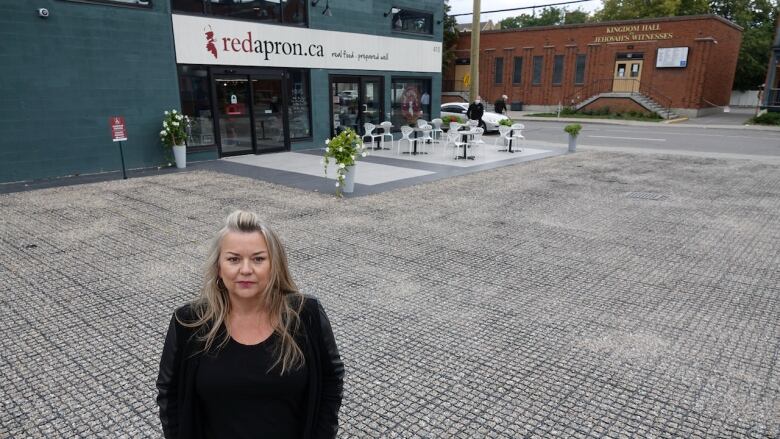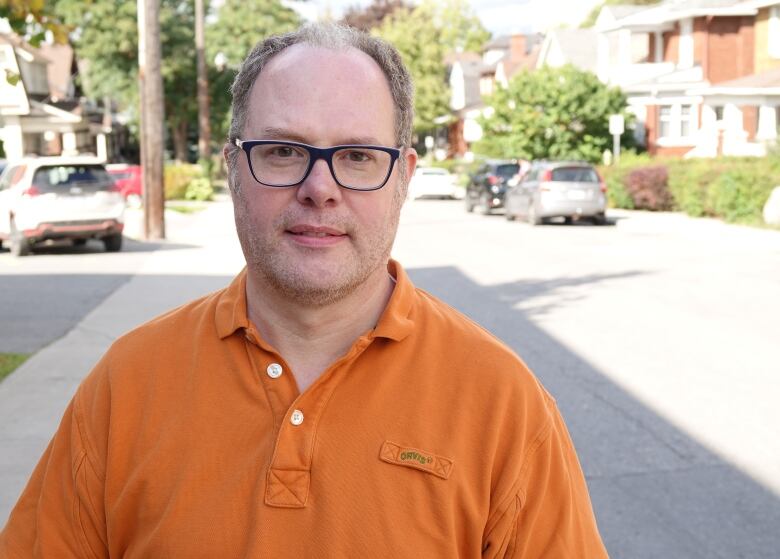'It's all they talk about': Permeable parking lot piques food shoppers' interest
Eco-friendlier parking lot creates a buzz at new location of central Ottawa shop

When Jennifer Heagle opened the new location for food specialty shop Red Apron, she didn't expect the parking lot to be a main talking point.
"We have this beautiful space that we've created to cook really good food, and the number one question people have is 'Tell me about this parking lot,'" said Heagle, who is a co-owner.
"It's all they talk about."
Rather than asphalt, the parking lot at the Red Apron's new location on Gladstone Avenue, just down the street from its old home,is covered in gravel,held in place by a grid made of recycled plastic.
The result, said Heagle, is a surface that supports large vehicles while minimizing the ecological impact.
"Instead of washing all of the rain into the storm sewers, it drains into the soil,"she said.
The parking lot also avoids a petroleum-based product like asphalt,lowersthelot's "heat island" effect during the summerwhereby uncovered parking lots contribute to higher temperatures and there is an expected 90 per cent reduction in the use of road salt during the winter.

'Positive contribution to the city'
Heaglesaid when she and her partners decided to build a new shop, the site's parking lot was in a terrible state with several layers of asphalt re-paved over the years.
"We were really focused on using environmentally friendly solutionswhenever we could, and the big question was the parking lot.'What are we going to do with it?'" she said.
Heagle's contractor suggested thepermeable product manufactured byPurusEcorasterinListowel, Ont.

While not new, more residential and commercial propertyowners have shown interest in ecologically friendly solutions for their parking surfaces, according to Toon Dreessen, president of DCA Architects in Ottawa.
"What this owner has done is make a really positive contribution to the city," he said. "That small step is one small piece of an overall bigger city initiative to fight climate change,and I think more of us need to do that."
Dreessenalso said products have become moredurable in recent years, with more options available.
According to Purus Ecoraster, their product can handle snow removal as long as the operator is careful not to scrape too close to the gravel, and the surface is still accessible for peopleusing wheelchairs or walkers.
WATCH | Jennifer Heagle on the eco-friendly parking lot:
As for the price tag,Heagle saidthe permeable parking lot was more expensive thananother layer of asphalt,but comparable to excavating and repaving the entire lot of 15 spaces.
With heavier rainfalls and larger snow melts affecting places like Ottawa, Dreessen said governmentsneedto encourage solutionsthat ease the pressure oncity infrastructures.
"You're spending a bit more capital up front, so there should be some incentive to do so because it's better for the planet," he said.
"Whenever you have an opportunity to do the right thing, you should just do the right thing," Heagle said.













_(720p).jpg)


 OFFICIAL HD MUSIC VIDEO.jpg)
.jpg)



























































































